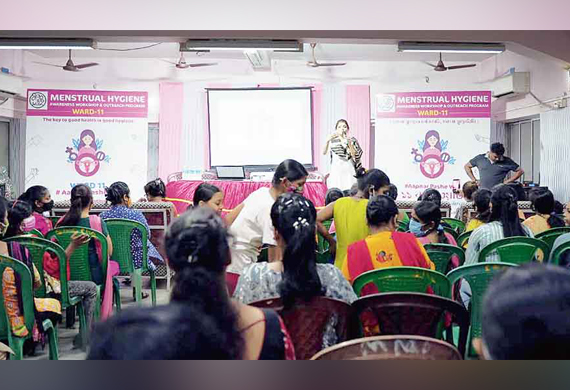
Menstrual Hygiene Session for Women in Kolkata Slums
By: WE Staff | Monday, 4 April 2022
A group of girls and women from urban slums were taught about menstrual hygiene and healthy practises, many of whom still rely on unsanitary alternatives during menstruation.
Over 200 women from north Kolkata neighbourhoods attended the awareness programme, which also attempted to break the taboo surrounding menstruation and treat their gynaecological concerns, which many women typically ignore or are forced to do so.
The menstrual hygiene awareness session began with the delivery of free sanitary napkins door to door in shanties, followed by instruction on healthy behaviours for girls and women.
Priyadarshini Ghosh, a businesswoman and social worker who began her work in Kolkata's Ward 11, “We want them to develop the habit of using hygienic sanitary napkins. Once they develop that, they will not go back to unhygienic alternatives.”
Trinamul Mahila Congress has launched an awareness and outreach campaign. The project began with the delivery of sanitary napkins to 400 women in Hatibagan, Aurobindo Sarani, Nalin Sarkar Street, and Madhab Das Lane slums.
For many women, the stigma is real, according to Ghosh.
As Ghosh went door to door, she noted that after receiving the sanitary napkins, a group of young girls joined her in the outreach.
Ghosh said, “We deliberately took the black packet away and gave them the sanitary pads in white packets. We intend to take away that cover because there should be nothing to hide. But the process has to be gradual.”
Ghosh added, “It was liberating for them to be able to come out in the open and talk about menstruation in the presence of male bystanders. But there is a section of middle-aged women who are still shy about talking about menstruation or prolonging the conversation in any way. It is those homes that we have to go to again and again.”
Participants in the session were shown documentaries on how a parent obtains sanitary napkins for his daughter or a spouse obtains sanitary napkins for his wife.
Breaking the stigma will take time, and Ghosh stated that she would need to give the ladies both time and space to do it.
She exclusively invited girls and women to the workshop because she knew many of them would not show up if there were guys there.
“In order to bring their guard down, I have to give them a comfortable space. If we are to involve male members right at the onset, it will attract more rigidity. My first priority is health. The breakdown of the stigma is second,” said Ghosh.
The project's third phase will see the establishment of at least one production machine in the constituency, allowing women and girls to purchase sanitary pads for as little as Re 1.


.jpg)



